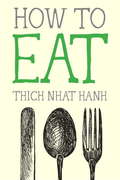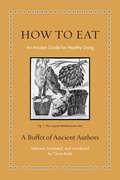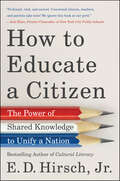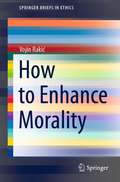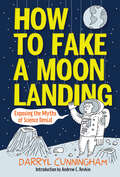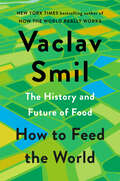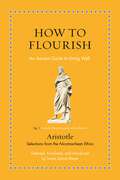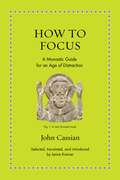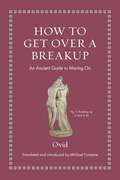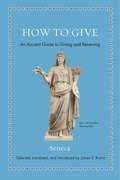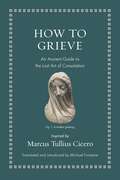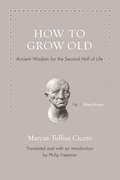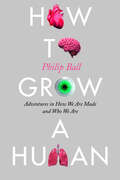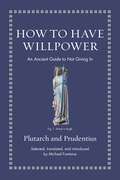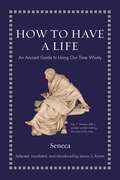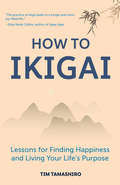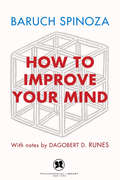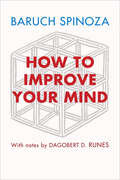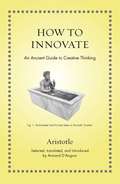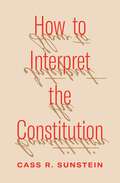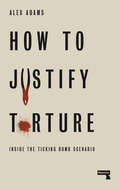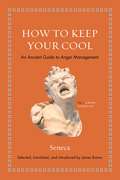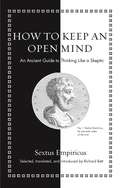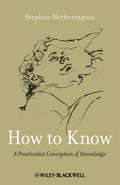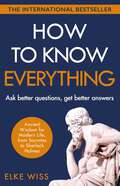- Table View
- List View
How to Eat (Mindfulness Essentials)
by Thich Nhat Hanh Jason DeantonisHow to Eat is part of the Mindfulness Essentials Series by Zen Master Thich Nhat Hanh, illuminating the basics of mindfulness practice. <P> These short meditations cover everything from eating with others and enjoying our food to connecting with the Earth. Nhat Hanh inspires a joyful and sustainable relationship with all aspects of eating, including gardening, food shopping, preparing, serving, and even clearning up after a meal. How to Eat is a welcome reminder that the benefits of mindful eating are both personal and global.
How to Eat: An Ancient Guide for Healthy Living (Ancient Wisdom for Modern Readers)
by Claire BubbA delicious feast of ancient Greek and Roman writings on living well by eating well Today, we&’re stuffed with dietary recommendations from every direction. Social media, advertising, food packaging, diet books, doctors—all have advice on what, how much, and when to eat. This would have been no surprise to ancient Greeks and Romans. Their doctors were intensely interested in food, offered highly prescriptive dietary advice, and developed detailed systems to categorize foods and their health effects. How to Eat is a delectable anthology of Greco-Roman writings on how to eat, exercise, sleep, bathe, and manage your sex life for optimal health. It also gathers ancient opinions on specific foods of all sorts, from how to deploy onions to cure baldness and cabbage to get sober to whether lentils are healthy and why arugula increases your sex drive.With lively new translations by Claire Bubb, and the original Greek and Latin texts on facing pages, How to Eat features voices from medicine, philosophy, natural history, agriculture, and cooking, including Hippocrates, Pliny the Elder, Galen, Seneca, Plutarch, and Cato.While medicine and science have obviously changed enormously since the classical world, and some Greco-Roman beliefs about diet now appear hilariously off the mark, How to Eat reveals that much of their advice still resonates—and all of it is fascinating.
How to Educate a Citizen: The Power of Shared Knowledge to Unify a Nation
by E. D. Hirsch Jr.Why a dumbed-down curriculum is bad for our democracy: “A persuasive, scientifically sound case for an education revolution.” — Shelf AwarenessIn How to Educate a Citizen, E.D. Hirsch continues the conversation he began thirty years ago with his classic bestseller Cultural Literacy, urging America’s public schools, particularly at the elementary level, to educate our children more effectively to help heal and preserve the nation. Since the 1960s, our schools have been relying on “child-centered learning.” History, geography, science, civics, and other essential knowledge have been dumbed down by vacuous learning “techniques” and “values-based” curricula; indoctrinated by graduate schools of education, administrators and educators have believed they are teaching reading and critical thinking skills. Yet these cannot be taught in the absence of strong content, Hirsch argues.The consequence is a loss of shared knowledge that would enable us to work together, understand one another, and make coherent, informed decisions. A broken approach to school not only leaves our children underprepared and erodes the American dream but also loosens the bonds that hold the nation together. Drawing on early schoolmasters and educational reformers such as Noah Webster and Horace Mann, Hirsch charts the rise and fall of the American early education system and provides a blueprint for closing the national gap in knowledge, communications, and allegiance. Critical and compelling, How to Educate a Citizen galvanizes our schools to equip children with the power of shared knowledge.“Concerned citizens , teachers, and parents take note! We ignore this book at our peril.” —Joel Klein, former Chancellor of New York City Public Schools
How to Enhance Morality (SpringerBriefs in Ethics)
by Vojin RakićThis book offers an innovative approach to moral enhancement. We, as humans, have a moral duty to be as good as we can be. Hence, moral bio-enhancement (MBE), if effective and safe, is our moral duty. However, it has to be voluntary because if it is made compulsory, human freedom (of the will) would be curtailed. As freedom (of the will) is an essential component of humanness, compulsory MBE would infringe upon our humanness.An essential question is; what will motivate humans to subject themselves voluntarily to MBE?The book argues - and supports by using empirical/experimental evidence - that morality and happiness operate in a circularly supportive relationship that applies to most humans most of the time: the better they are, the happier they will be; the happier they are, the better they will be. Hence, the grounding rationale for MBE ought not to be the prevention of “ultimate harm” based on compulsory MBE (as argued by Persson and Savulescu), but human happiness based on voluntary MBE. The primary objective of the book is to provide the readers with an original view on moral enhancement, whilst proposing a novel conception of moral enhancement that is informed by new biotechnological developments.
How to Fake a Moon Landing: Exposing the Myths of Science Denial
by Darryl CunninghamA collection of &“lively, plain-language debunkings of seven cases of quack or fraudulent science and . . . antiscientific bias in general&” (Booklist). Is hydro-fracking safe? Is climate change real? Did the moon landing actually happen? How about evolution: fact or fiction? Author-illustrator Darryl Cunningham looks at these and other hot-button science topics and presents a fact-based, visual assessment of current thinking and research on eight different issues everybody&’s arguing about. His lively storytelling approach incorporates comics, photographs, and diagrams to create substantive but easily accessible reportage. Cunningham&’s distinctive illustrative style shows how information is manipulated by all sides; his easy-to-follow narratives allow readers to draw their own fact-based conclusions. A graphic milestone of investigative journalism! &“Cartoonist Darryl Cunningham . . . is a welcome voice, shedding some much needed light on the darker areas of science and culture. . . . Cunningham does a remarkable job with difficult material and for high school students, just opening their eyes to the world around them, this is a terrific primer.&” —ComicMix
How to Feed the World: The History and Future of Food
by Vaclav Smil"Vaclav Smil is my favorite author."—Bill GatesAn indispensable analysis of how the world really produces and consumes its food—and a scientist's exploration of how we can successfully feed a growing population without killing the planetWe have never had to feed as many people as we do today. And yet, we misunderstand the essentials of where our food really comes from, how our dietary requirements shape us, and why this impacts our planet in drastic ways. As a result, in our economic, political, and everyday choices, we take for granted and fail to prioritize the thing that makes all our lives possible: food.In this ambitious, myth-busting book, Smil investigates many of the burning questions facing the world today: why are some of the world&’s biggest food producers also the countries with the most undernourished populations? Why do we waste so much food and how can we solve that? Could the whole planet go vegan and be healthy? Should it? He explores the global history of food production to understand why we farm some animals and not others, why most of the world&’s calories come from just a few foodstuffs, and how this might change in the future.How to Feed the World is the data-based, rigorously researched guide that offers solutions to our broken global food system.
How to Flourish: An Ancient Guide to Living Well (Ancient Wisdom For Modern Readers Ser.)
by AristotleAristotle’s essential guide to human flourishing—the Nicomachean Ethics—in a lively new abridged translationAristotle’s Nicomachean Ethics is one of the greatest guides to human flourishing ever written, but its length and style have left many readers languishing. How to Flourish is a carefully abridged version of the entire work in a highly readable and colloquial new translation by Susan Sauvé Meyer that makes Aristotle’s timeless insights about how to lead a good life more engaging and accessible than ever before.For Aristotle, flourishing involves becoming a good person through practice, and having a life of the mind. To that end, he draws vivid portraits of virtuous and vicious characters and offers sound practical advice about everything from eating and drinking to managing money, controlling anger, getting along with others, and telling jokes. He also distinguishes different kinds of wisdom that are essential to flourishing and offers an unusual perspective on how to appreciate our place in the universe and our relation to the divine.Omitting Aristotle’s digressions and repetitions and overly technical passages, How to Flourish provides connecting commentary that allows readers to follow the continuous line of his thought; it also features the original Greek on facing pages. The result is an inviting and lively version of an essential work about how to flourish and lead a good life.
How to Focus: A Monastic Guide for an Age of Distraction (Ancient Wisdom for Modern Readers)
by John CassianHow you can learn to focus like a monk without living like oneDistraction isn’t a new problem. We’re also not the first to complain about how hard it is to concentrate. Early Christian monks beat us to it. They had given up everything to focus on God, yet they still struggled to keep the demons of distraction at bay. But rather than surrender to the meandering of their minds, they developed powerful strategies to improve their attention and engagement. How to Focus is an inviting collection of their strikingly relatable insights and advice—frank, funny, sympathetic, and psychologically sophisticated.This wisdom is drawn from John Cassian’s fifth-century CE Collationes, one of the most influential manuals for monks from late antiquity. The Collationes follow Cassian and his friend Germanus as they travel around Egypt, asking a series of sage monks how they can make their minds stronger. In response, these monks offer a range of techniques for increasing focus, including setting goals, training the body, managing the memory, using mantras, taking breaks, consulting others—and, most of all, being honest about yourself. As Cassian and Germanus eventually realize, we can’t escape distraction—but we can learn how to confront it and, eventually, to concentrate.Featuring an engaging new translation by Jamie Kreiner and the original Latin on facing pages, How to Focus can help even the least monkish of us to train our attention on what matters most.
How to Get Over a Breakup: An Ancient Guide to Moving On (Ancient Wisdom for Modern Readers)
by OvidA modern translation of the ancient Roman poet Ovid&’s Remedies for Love—a witty and irreverent work about how to fall out of loveBreakups are the worst. On one scale devised by psychiatrists, only a spouse&’s death was ranked as more stressful than a marital split. Is there any treatment for a breakup? The ancient Roman poet Ovid thought so. Having become famous for teaching the art of seduction in The Art of Love, he then wrote Remedies for Love (Remedia Amoris), which presents thirty-eight frank and witty strategies for coping with unrequited love, falling out of love, ending a relationship, and healing a broken heart. How to Get Over a Breakup presents an unabashedly modern prose translation of Ovid&’s lighthearted and provocative work, complete with a lively introduction and the original Latin on facing pages.Ovid&’s advice—which he illustrates with ingenious interpretations of classical mythology—ranges from the practical, psychologically astute, and profound to the ironic, deliberately offensive, and bizarre. Some advice is conventional—such as staying busy, not spending time alone, and avoiding places associated with an ex. Some is off-color, such as having sex until you&’re sick of it. And some is simply and delightfully weird—such as becoming a lawyer and not eating arugula.Whether his advice is good or bad, entertaining or outrageous, How to Get Over a Breakup reveals an Ovid who sounds startlingly modern.
How to Give: An Ancient Guide to Giving and Receiving (Ancient Wisdom for Modern Readers)
by SenecaTimeless wisdom on generosity and gratitude from the great Stoic philosopher SenecaTo give and receive well may be the most human thing you can do—but it is also the closest you can come to divinity. So argues the great Roman Stoic thinker Seneca (c. 4 BCE–65 CE) in his longest and most searching moral treatise, “On Benefits” (De Beneficiis). James Romm’s splendid new translation of essential selections from this work conveys the heart of Seneca’s argument that generosity and gratitude are among the most important of all virtues.For Seneca, the impulse to give to others lies at the very foundation of society; without it, we are helpless creatures, worse than wild beasts. But generosity did not arise randomly or by chance. Seneca sees it as part of our desire to emulate the gods, whose creation of the earth and heavens stands as the greatest gift of all. Seneca’s soaring prose captures his wonder at that gift, and expresses a profound sense of gratitude that will inspire today’s readers.Complete with an enlightening introduction and the original Latin on facing pages, How to Give is a timeless guide to the profound significance of true generosity.
How to Grieve: An Ancient Guide to the Lost Art of Consolation (Ancient Wisdom for Modern Readers)
by Marcus Tullius CiceroAn engaging new translation of a timeless masterpiece about coping with the death of a loved oneIn 45 BCE, the Roman statesman Cicero fell to pieces when his beloved daughter, Tullia, died from complications of childbirth. But from the depths of despair, Cicero fought his way back. In an effort to cope with his loss, he wrote a consolation speech—not for others, as had always been done, but for himself. And it worked. Cicero’s Consolation was something new in literature, equal parts philosophy and motivational speech. Drawing on the full range of Greek philosophy and Roman history, Cicero convinced himself that death and loss are part of life, and that if others have survived them, we can, too; resilience, endurance, and fortitude are the way forward.Lost in antiquity, Cicero’s Consolation was recreated in the Renaissance from hints in Cicero’s other writings and the Greek and Latin consolatory tradition. The resulting masterpiece—translated here for the first time in 250 years—is infused throughout with Cicero’s thought and spirit.Complete with the original Latin on facing pages and an inviting introduction, Michael Fontaine’s engaging translation makes this searching exploration of grief available to readers once again.
How to Grow Old: Ancient Wisdom for the Second Half of Life (Ancient Wisdom for Modern Readers)
by Marcus Tullius CiceroTimeless wisdom on growing old gracefully from one of ancient Rome's greatest philosophersWorried that old age will inevitably mean losing your libido, your health, and possibly your marbles too? Well, Cicero has some good news for you. In How to Grow Old, the great Roman orator and statesman eloquently describes how you can make the second half of life the best part of all—and why you might discover that reading and gardening are actually far more pleasurable than sex ever was.Filled with timeless wisdom and practical guidance, Cicero's brief, charming classic—written in 44 BC and originally titled On Old Age—has delighted and inspired readers, from Saint Augustine to Thomas Jefferson, for more than two thousand years. Presented here in a lively new translation with an informative new introduction and the original Latin on facing pages, the book directly addresses the greatest fears of growing older and persuasively argues why these worries are greatly exaggerated—or altogether mistaken.Montaigne said Cicero's book "gives one an appetite for growing old." The American founding father John Adams read it repeatedly in his later years. And today its lessons are more relevant than ever in a world obsessed with the futile pursuit of youth.
How to Grow a Human: Adventures in How We Are Made and Who We Are
by Philip BallThe award-winning science writer shares “a winding romp through advances in cell biology [that] pushes readers to ponder the boundaries of life” (Science).In the summer of 2017, scientists removed a tiny piece of flesh from Philip Ball’s arm and turned it into a rudimentary “mini-brain.” The skin cells, removed from his body, did not die but were instead transformed into nerve cells that independently arranged themselves into a dense network and communicated with each other, exchanging the raw signals of thought. This was life—but whose? That disconcerting question is the focus of Philip Ball’s How to Grow a Human.In this mind-bending tour of cutting-edge cell biology, Ball shows how recent innovations could lead to tailor-made replacement organs; new medical advances for repairing damage and assisting conception; and new ways of “growing a human.” Such methods would also create new options for gene editing, with all the attendant moral dilemmas. Ball argues that these advances can never be “just about the science,” because they are already laden with a host of social narratives, preconceptions, and prejudices. But beyond even that, these developments raise provocative questions about identity and self, birth and death, and force us to ask how mutable the human body really is—and what forms it might take in years to come.
How to Have Willpower: An Ancient Guide to Not Giving In (Ancient Wisdom for Modern Readers)
by Plutarch PrudentiusLively new translations of two classical works that offer wise advice about how to resist temptationHow to Have Willpower brings together two profound ancient meditations on how to overcome pressures that encourage us to act against our own best interests—Plutarch&’s essay On Dysopia or How to Resist Pressure and Prudentius&’s poetic allegory Psychomachia or How to Slay Your Demons. Challenging the idea that humans are helpless victims of vice, these works—introduced and presented in vivid, accessible new prose translations by Michael Fontaine, with the original Latin and Greek texts on facing pages—emphasize the power of personal choice and the possibility of personal growth, as they offer insights and practical advice about resisting temptation.In the spirit of the best ancient self-help writing, Plutarch, a pagan Greek philosopher and historian, offers a set of practical recommendations and steps we can take to resist pressure and to stop saying &“yes&” against our better judgment. And in a delightfully different work, Prudentius, a Latin Christian poet, dramatizes the necessity to actively fight temptation through the story of an epic battle within the human soul between fierce warrior women representing our virtues and vices.Plutarch and Prudentius insist that we allow pressure or temptations to get the best of us. But they also agree that we can do something about it. And their wisdom can help.
How to Have a Life: An Ancient Guide to Using Our Time Wisely (Ancient Wisdom for Modern Readers)
by SenecaA vibrant new translation of Seneca’s “On the Shortness of Life,” a pointed reminder to make the most of our timeWho doesn’t worry sometimes that smart phones, the Internet, and TV are robbing us of time and preventing us from having a life? How can we make the most of our time on earth? In the first century AD, the Stoic philosopher Seneca the Younger offered one of the most famous answers to that question in his essay “On the Shortness of Life”—a work that has more to teach us today than ever before. In How to Have a Life, James Romm presents a vibrant new translation of Seneca’s brilliant essay, plus two Senecan letters on the same theme, complete with the original Latin on facing pages and an inviting introduction.With devastating satiric wit, skillfully captured in this translation, Seneca lampoons the ways we squander our time and fail to realize how precious it is. We don’t allow people to steal our money, yet we allow them to plunder our time, or else we give it away ourselves in useless, idle pursuits. Seneca also describes how we can make better use of our brief days and years. In the process, he argues, we can make our lives longer, or even everlasting, because to live a real life is to attain a kind of immortality.A counterweight to the time-sucking distractions of the modern world, How to Have a Life offers priceless wisdom about making our time—and our lives—count.
How to Ikigai: Lessons for Finding Happiness and Living Your Life's Purpose
by Tim TamashiroDiscover your reason to get out of bed in the morning with the ancient Japanese philosophy that &“leads to a longer and more joy-filled life&” (Elise Marie Collins, author of Super Ager). Okinawa, Japan is a tiny, tiny island south of the Japanese mainland where people live their life&’s purpose every day. How is it possible for so many to live each day in such meaningful ways? The Okinawan concept of Ikigai. How to Ikigai describes the lifestyle choices that have led to an island full of fulfilled, long-living people. Examples of Ikigai in action are often magical. Take David Michiels. David stuttered severely well into his adulthood. In clinical terms, his stutter was difficult to treat. But David started to work in a liquor store. Before long, his focus turned to one specific section of the sales floor: the scotch section. As he spent more of his days learning about scotch, he began to share his knowledge with customers. Eventually, David noticed that his stutter vanished when he talked to anyone about scotch. Over time, David&’s passion led to a new life. Today, he is a renowned whiskey expert, traveling the world tasting and purchasing whiskey on behalf of his employer. He feels his life is meaningful because of Ikigai. How to Ikigai explains a simple but abstract map for living a meaningful life. After reading this book, you will understand how to implement Ikigai&’s four directions in your own life: · Do what you love · Do what you&’re good at · Do what the world needs · Do what you can be rewarded for
How to Improve Your Mind
by Dagobert D. Runes Baruch SpinozaHow to Improve Your Mind is an engaging philosophical text by master Enlightenment thinker Baruch Spinoza. Dr. Dagobert D. Runes, the founder of Philosophical Library, and Albert Einstein were close friends and colleagues who regarded Spinoza as the greatest of modern philosophers. This edition includes exclusive commentary and biographical notes written by Dagobert D. Runes.
How to Improve Your Mind
by Baruch SpinozaThe Enlightenment thinker asserts that mental tranquility is achieved through knowledge of God in this brief philosophical treatise.Seventeenth-century philosopher Baruch Spinoza was one of the most original and important thinkers of his time. His magnum opus, Ethics, influenced generations of great minds from Karl Marx to Ludwig Wittgenstein and George Santayana. In this earlier work, Spinoza articulates his view that life is best lived with the supreme happiness of knowing God&’s infinite love. By extension, all earthly pursuits—including money, fame, and sex—are mere distractions from the greater joy of the soul&’s quietude. This edition of How to Improve Your Mind is translated by the philosopher and founder of the Philosophical Library, Dagobert D. Runes. Runes also provides exclusive commentary and biographical notes.
How to Innovate: An Ancient Guide to Creative Thinking (Ancient Wisdom for Modern Readers)
by AristotleWhat we can learn about fostering innovation and creative thinking from some of the most inventive people of all times—the ancient GreeksWhen it comes to innovation and creative thinking, we are still catching up with the ancient Greeks. Between 800 and 300 BCE, they changed the world with astonishing inventions—democracy, the alphabet, philosophy, logic, rhetoric, mathematical proof, rational medicine, coins, architectural canons, drama, lifelike sculpture, and competitive athletics. None of this happened by accident. Recognizing the power of the new and trying to understand and promote the conditions that make it possible, the Greeks were the first to write about innovation and even the first to record a word for forging something new. In short, the Greeks “invented” innovation itself—and they still have a great deal to teach us about it.How to Innovate is an engaging and entertaining introduction to key ideas about—and examples of—innovation and creative thinking from ancient Greece. Armand D’Angour provides lively new translations of selections from Aristotle, Diodorus, and Athenaeus, with the original Greek text on facing pages. These writings illuminate and illustrate timeless principles of creating something new—borrowing or adapting existing ideas or things, cross-fertilizing disparate elements, or criticizing and disrupting current conditions.From the true story of Archimedes’s famous “Eureka!” moment, to Aristotle’s thoughts on physical change and political innovation, to accounts of how disruption and competition drove invention in Greek warfare and the visual arts, How to Innovate is filled with valuable insights about how change happens—and how to bring it about.
How to Interpret the Constitution
by Cass R. SunsteinFrom New York Times bestselling author Cass Sunstein, a timely and powerful argument for rethinking how the U.S. Constitution is interpretedThe U.S. Supreme Court has eliminated the right to abortion and is revisiting other fundamental questions today—about voting rights, affirmative action, gun laws, and much more. Once-arcane theories of constitutional interpretation are profoundly affecting the lives of all Americans. In this brief and urgent book, Harvard Law School professor Cass Sunstein provides a lively introduction to competing approaches to interpreting the Constitution—and argues that the only way to choose one is to ask whether it would change American life for the better or worse. If a method of interpretation would eliminate the right of privacy, allow racial segregation, or obliterate free speech, it would be unacceptable for that reason.But some Supreme Court justices are committed to “originalism,” arguing that the meaning of the Constitution is settled by how it was publicly understood when it was ratified. Originalists insist that their approach is dictated by the Constitution. That, Sunstein argues, is a big mistake. The Constitution doesn’t contain instructions for its own interpretation. Any approach to constitutional interpretation needs to be defended in terms of its broad effects—what it does to our rights and our institutions. It must respect those rights and institutions—and safeguard the conditions for democracy itself.Passionate and compelling, How to Interpret the Constitution is essential reading for anyone who is concerned about how the Supreme Court is changing the rights and lives of Americans today.
How to Justify Torture: Inside the Ticking Bomb Scenario
by Alex AdamsFrom Batman Begins to Tom Clancy, How to Justify Torture shows how contemporary culture creates simplified narratives about good guy torturers and bad guy victims, how dangerous this is politically, and what we can do to challenge it.If there was a bomb hidden somewhere in a major city, and you had the person responsible in your custody, would you torture them to get the information needed to stop the bomb exploding, preventing a devastating terrorist attack and saving thousands of lives?This is the ticking bomb scenario -- a thought experiment designed to demonstrate that torture can be justified.In How to Justify Torture, cultural critic Alex Adams examines the ticking bomb scenario in-depth, looking at the ways it is presented in films, novels, and TV shows -- from Batman Begins and Dirty Harry to French military thrillers and home invasion narratives. By critiquing its argument step by step, this short, provocative book reminds us that, despite what the ticking bomb scenario will have us believe, torture can never be justified.
How to Keep Your Cool: An Ancient Guide to Anger Management (Ancient Wisdom For Modern Readers Ser.)
by Seneca James S. RommTimeless wisdom on controlling anger in personal life and politics from the Roman Stoic philosopher and statesman SenecaIn his essay “On Anger” (De Ira), the Roman Stoic thinker Seneca (c. 4 BC–65 AD) argues that anger is the most destructive passion: “No plague has cost the human race more dear.” This was proved by his own life, which he barely preserved under one wrathful emperor, Caligula, and lost under a second, Nero. This splendid new translation of essential selections from “On Anger,” presented with an enlightening introduction and the original Latin on facing pages, offers readers a timeless guide to avoiding and managing anger. It vividly illustrates why the emotion is so dangerous and why controlling it would bring vast benefits to individuals and society.Drawing on his great arsenal of rhetoric, including historical examples (especially from Caligula’s horrific reign), anecdotes, quips, and soaring flights of eloquence, Seneca builds his case against anger with mounting intensity. Like a fire-and-brimstone preacher, he paints a grim picture of the moral perils to which anger exposes us, tracing nearly all the world’s evils to this one toxic source. But he then uplifts us with a beatific vision of the alternate path, a path of forgiveness and compassion that resonates with Christian and Buddhist ethics.Seneca’s thoughts on anger have never been more relevant than today, when uncivil discourse has increasingly infected public debate. Whether seeking personal growth or political renewal, readers will find, in Seneca’s wisdom, a valuable antidote to the ills of an angry age.
How to Keep an Open Mind: An Ancient Guide to Thinking Like a Skeptic (Ancient Wisdom for Modern Readers)
by Sextus EmpiricusHow ancient skepticism can help you attain tranquility by learning to suspend judgmentAlong with Stoicism and Epicureanism, Skepticism is one of the three major schools of ancient Greek philosophy that claim to offer a way of living as well as thinking. How to Keep an Open Mind provides an unmatched introduction to skepticism by presenting a fresh, modern translation of key passages from the writings of Sextus Empiricus, the only Greek skeptic whose works have survived.While content in daily life to go along with things as they appear to be, Sextus advocated—and provided a set of techniques to achieve—a radical suspension of judgment about the way things really are, believing that such nonjudging can be useful for challenging the unfounded dogmatism of others and may help one achieve a state of calm and tranquility. In an introduction, Richard Bett makes the case that the most important lesson we can draw from Sextus’s brand of skepticism today may be an ability to see what can be said on the other side of any issue, leading to a greater open-mindedness.Complete with the original Greek on facing pages, How to Keep an Open Mind offers a compelling antidote to the closed-minded dogmatism of today’s polarized world.
How to Know A Practicalist Conception of Knowledge
by Stephen HetheringtonSome key aspects of contemporary epistemology deserve to be challenged, and How to Know does just that. This book argues that several long-standing presumptions at the heart of the standard analytic conception of knowledge are false, and defends an alternative, a practicalist conception of knowledge. Presents a philosophically original conception of knowledge, at odds with some central tenets of analytic epistemology Offers a dissolution of epistemology's infamous Gettier problem - explaining why the supposed problem was never really a problem in the first place. Defends an unorthodox conception of the relationship between knowledge-that and knowledge-how, understanding knowledge-that as a kind of knowledge-how.
How to Know Everything: Ask better questions, get better answers
by Elke WissThe international bestseller that will sharpen your mind, broaden your perspective and transform your relationships._____________________________________________________WHY ARE WE SO BAD AT ASKING GOOD QUESTIONS?In an increasingly polarized world, asking better questions in our daily and working lives is a radical shortcut to personal and professional success. It can create space for us to rethink our positions, find answers together, and even change our minds for the better.Drawing on the lessons of Socrates and other great thinkers, practical philosopher Elke Wiss lays out an essential toolkit to help you:· Transform debates into dialogues · Embrace your doubts like a true philosopher· Ditch your ego and become an active listener· Discover an open and curious Socratic attitude· Learn Sherlock Holmes's powers of observation · Open conversations up or dig down deeper with key question types· Explore thorny issues and avoid classic question pitfalls· Face your fear of asking and start connectingThe right questions can unlock the answers to anything - and help you know everything, without being a know-it-all. _____________________________WHAT READERS ARE SAYING:'Read this book, it will enrich your life!''A disarming and urgent book in today's world!''A great book for anyone who wants to better understand themselves and others!''Everyone should read this. What fascinating conversations we would have then!''A clear and practical book for brave thinkers who want to start having better, deeper conversations.''I found this book so valuable! A real enrichment to my daily life.' 'What a gem this book is!''Highly recommended for anyone who usually gets bogged down in discussions, quarrels, disagreements that lead to nothing.''A ray of hope in a time of dispute and polarization.' 'Elke Wiss makes practical philosophy manageable for everyone. A must read!''A cheerful, unconventional book.' 'An inspiring, easy-to-read book, full of practical exercises to get yourself started right away. For me it's a must read!''Its powerful message urges us to connect more with each other and with ourselves.''Some books can actually change your worldview or your daily actions, and as far as I'm concerned this is one of them. I recommend it to everyone.'
